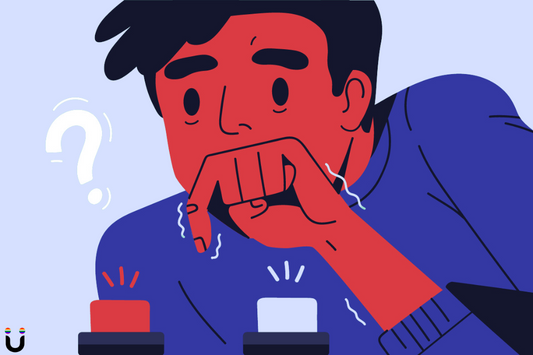Life is a series of decisions, each carrying consequences that ripple outward. Sometimes, those ripples bring clarity and relief. More often than not, they stir discomfort, doubt, and unexpected emotions. Making the “right” decision doesn’t always mean making the easiest one or the one that feels good in the moment. Sometimes, it means choosing growth over comfort—even when the path ahead feels uncertain.
I recently faced one of those decisions. Leaving my role at The Thought Co., a place where I felt supported and valued, wasn’t easy. But I knew it was necessary. Pursuing further education, especially within the rigid requirements of becoming a clinical psychologist in India, had become unavoidable. Balancing what I wanted with the responsibilities I carried—toward my clients, my work, and myself—was incredibly challenging. In the end, I chose to pause my career to focus on what I needed for the future.
The hardest part wasn’t making the decision itself but navigating the feelings that followed.
Guilt weighed heavily on me. I wondered if I was being selfish by prioritizing my needs over the people I served. But I kept coming back to the analogy of the oxygen mask on an airplane: If I didn’t take care of myself first, how could I help others effectively?
Even with that understanding, this choice left me feeling untethered. I’ve always thrived on structure and purpose, and now, without the daily rhythm of work, I feel aimless and unsure. The idea of “ripping off the band-aid” suggests that pain ends quickly once a decision is made, but the truth is, the pain stays on.
Big life changes have a way of making emotions feel overwhelming. When I was younger, I would often let my feelings take the wheel—reacting on impulse and letting them call the shots. As I’ve grown, I’ve learned that feelings aren’t the enemy, but they also aren’t the boss. They’re signals, pointing to areas that need attention, but they don’t always tell the whole story.
This understanding doesn’t erase the doubts. Like many, I’ve struggled with the fear of making the wrong choice. Regret and guilt often follow decisions, especially when they affect others. These emotions are natural, but they can also trap us in cycles of overthinking and second-guessing. Research on decision-making (Gilbert, 2006) supports this, showing that regret often stems from the perception of a “better choice” and not necessarily the decision itself. We’re wired to see the alternative as more appealing, even if it wouldn't lead to a better outcome.
One hard truth I’ve come to terms with is that some people will see your choices as selfish—especially when your decision doesn’t align with their expectations. It’s uncomfortable, but it doesn’t make your choice wrong. People’s opinions of us are shaped by their own needs and experiences, and those perceptions often say more about them than about us. This aligns with research on social comparison theory (Festinger, 1954), which suggests that people tend to judge decisions through their personal frameworks, often leading to misunderstandings about others' motivations.
Guilt has a way of draining your energy and pulling focus from what really matters. While it’s important to acknowledge and respect the feelings of those affected by your choices, holding onto guilt doesn’t change what’s already done or make things any better. Then there’s regret—a tricky emotion that convinces us we could’ve made a better choice. But more often than not, that’s just an illusion. We make decisions based on what we know at the time, and if we were to go back, we’d probably choose the same. Instead of getting stuck in regret, we can treat those decisions as lessons, not mistakes—opportunities to grow rather than labels of “right” or “wrong.”
As someone who tends to overthink, I often lean on logic because it feels like the safest option. Logical decisions bring a sense of clarity, but they don’t always tell the whole story. Emotions, even when they’re messy, offer valuable insights that logic alone can’t provide. Finding a balance between thinking things through and listening to what you feel helps create more well-rounded, grounded decisions. This is backed by research on emotional intelligence (Goleman, 1995), which suggests that being aware of and understanding our emotions, rather than suppressing them, leads to better decision-making and overall well-being.
Big decisions often bring a wave of emotions, and that’s completely normal. Feeling uncomfortable doesn’t mean you’ve failed—it’s simply part of the process of growing. Embracing the complexity of your emotions doesn’t mean letting them take over; it means using them as a guide while you move forward. If you’re facing a tough choice, know that it’s okay to feel unsettled, to doubt yourself, or to worry about what others might think. But trust that taking a step forward, even when things feel uncertain, is how growth happens. It’s not about finding the “perfect” decision—it’s about making the one that feels right for the path you’re on, even if it’s challenging in the moment. In the end, that discomfort you feel is a sign of change, and it’s through change—no matter how uneasy it feels—that we often discover what we truly need.
References:
- Gilbert, D. (2006). Stumbling on Happiness. Vintage.
- Festinger, L. (1954). A Theory of Social Comparison Processes. Human Relations.
- Goleman, D. (1995). Emotional Intelligence: Why It Can Matter More Than IQ. Bantam Books.





